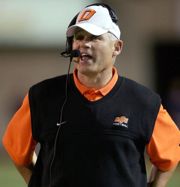 The Oklahoma State football program is well on its way to a catastrophic scandal in the wake of Part 1 of a bombshell investigative report Sports Illustrated published on the school Tuesday morning. The first part of the five-part series is entitled “The Money,” and it cites eight former Oklahoma State players who claim they received cash payments from people associated with the program as far back as 2001.
The Oklahoma State football program is well on its way to a catastrophic scandal in the wake of Part 1 of a bombshell investigative report Sports Illustrated published on the school Tuesday morning. The first part of the five-part series is entitled “The Money,” and it cites eight former Oklahoma State players who claim they received cash payments from people associated with the program as far back as 2001.
Les Miles was the head coach of the Cowboys when the players say the bonuses began, and the players named another 29 former student athletes who allegedly received payments for various reasons including on-field performance. Multiple players told Sports Illustrated that the annual payments ranged from about $2,000 to well over $25,000 in some instances.
The payments reportedly stretched from the Miles era in 2001 to at least 2011, when current head coach Mike Gundy was in charge. Gundy served as an offensive coordinator for the program beginning in 2001 and was named head coach in 2005.
Multiple players identified former assistant coach Joe DeForest as having a major role in the payment system. Players were allegedly paid various sums of money for big plays like sacks, interceptions, fumble recoveries and the like. Others claim they were given money by boosters who were simply looking to keep the program’s stars happy.
“They figure if a player shines and you pat him on the back in an obtainable way, he’s going to do whatever he can to keep getting that paper,” former offensive lineman Javius Townsend, a redshirt freshman in 2010, told SI.
Former cornerback Calvin Mickens said he was approached by a man he had never seen before after his first collegiate game in 2005. He had forced a fumble, broken up a pass and recorded two tackles. The man allegedly handed him $200.
“I was like, Wow, this is the life!” Mickens says. “I’m 18, playing football, and I just got $200.”
SI noted that staff members from the football team would routinely hand players envelopes after the game. The gesture in itself is not illegal, as the NCAA permits teams to give players around $15 for home games and whatever the going rate is for an athletic department employee when the team plays on the road.
However, former defensive lineman Brad Girtman says some of the envelopes were much fatter than others. In 2003, Girtman said he saw cornerback Darrent Williams, who was shot and killed as a member of the Denver Broncos in 2007, receive a stuffed envelope. Williams had just returned an interception 63 yards for a score in a huge 38-34 victory over Kansas State.
“I saw that one,” Girtman recalled. “I was like, Holy s—. I was getting paid on the low end. Some of those guys got monster payments.”
Some players said they would find a new pair of socks in their locker after games that would be filled with money. Other players like cornerback Chris Wright (2001-2003) say they did not take money but were aware of bonus systems that were in place. DeForest, who was the special teams coach at the time, allegedly set rewards between $100 and $500 for big plays on special teams. Wright claimed he has witnessed DeForest handing “stacks of bill” to players.
“It depends on who the player was, how many yards they ran for, how many catches they made, how many touchdowns they scored, how many tackles,” Wright explained. “It all depends on performance.”
Miles, now the head coach at LSU, and DeForest, now an assistant coach at West Virginia, both denied the accusations. Players said Miles made the team’s locker room more accessible to boosters when he took over in 2001, but Miles claims the opposite is true.
“I can tell you this: We have always done things right,” Miles said after LSU’s win on Saturday night, via ESPN.com.
Many more details are uncovered by SI in the first part of the five-part series. The entire thing is a recommended read. The ensuing four parts are called The Academics, The Drugs, The Sex and The Fallout. In “The Sex,” SI cites sources who claim the team’s hostess group became a key recruiting tool for the program and that a certain group of women had sex with recruits when they visited campus. Stay tuned.

